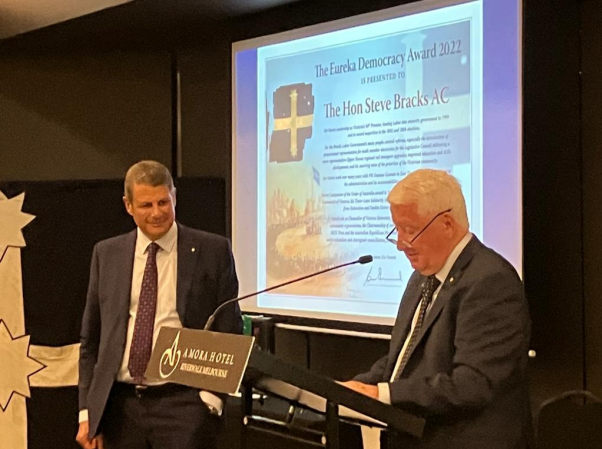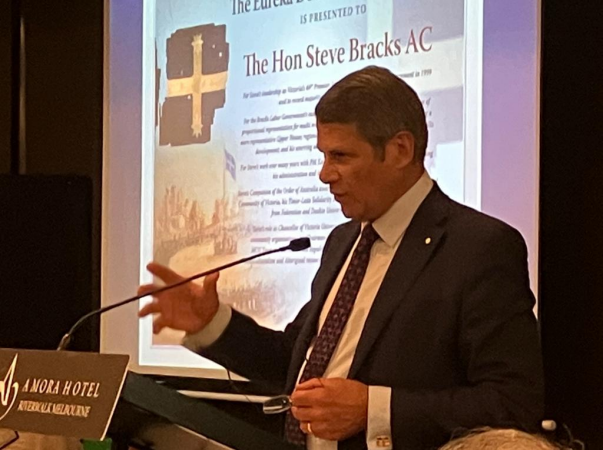Eureka Democracy Award: 2022 - Steve Bracks
Steve Bracks was announced as this year’s Winner of the Democracy Award. His contributions as Premier were immense. He became one of Victoria’s most successful and longest-serving Premiers, winning three consecutive elections, Page 4 achieving record majorities in the 2002 and 2006 elections, introducing substantial reforms in infrastructure and services, investing heavily in education and skills, lifting Victoria’s retention rate to Year 12 education to one of the highest in Australia, while maintaining strong budgets and a growing economy. With the support of all other Australian governments, Steve led a National Reform Agenda to increase workplace participation, improve skills, reduce business regulation and boost productivity.
After his resignation from the Office of Premier and from Parliament in 2007, Steve has held two major honorary positions, an advising role in East Timor working alongside the newly elected Prime Minister Xanana Gusmão assisting with the establishment of Gusmão's administration up to 2017; and Honorary Chair of the Union Education Foundation from 2011.
Accepting the award, Steve spoke movingly about his early years in Ballarat, leading on to a political career. He was always aware that Democracy could never be taken for granted, and needed to be protected and nurtured, with the example of the Diggers at Eureka always present.
After his resignation from the Office of Premier and from Parliament in 2007, Steve has held two major honorary positions, an advising role in East Timor working alongside the newly elected Prime Minister Xanana Gusmão assisting with the establishment of Gusmão's administration up to 2017; and Honorary Chair of the Union Education Foundation from 2011.
Accepting the award, Steve spoke movingly about his early years in Ballarat, leading on to a political career. He was always aware that Democracy could never be taken for granted, and needed to be protected and nurtured, with the example of the Diggers at Eureka always present.
The Hon Steve Bracks AC said "Thank you Eric, and thank you to all the Eureka Australia Committee Members for this honour.
Thank you also to Judith for your inspiring words, and for your on-going contribution to Australian history and public debate in Australia.
You would be an ideal candidate for a future Eureka Award!
Friends, I’m not going to spend too much time talking about the significance of Eureka to Australian democracy. Or about the reforms that my government introduced.
Growing up in Ballarat, like many of you, we were immersed in the story of the Eureka Stockade. It framed our understanding of Australia."
Thank you also to Judith for your inspiring words, and for your on-going contribution to Australian history and public debate in Australia.
You would be an ideal candidate for a future Eureka Award!
Friends, I’m not going to spend too much time talking about the significance of Eureka to Australian democracy. Or about the reforms that my government introduced.
Growing up in Ballarat, like many of you, we were immersed in the story of the Eureka Stockade. It framed our understanding of Australia."
We know the Eureka Stockade was the birthplace of democracy in Australia.
We know the famous catch cry that echoed around Ballarat in 1854 “no taxation without representation”.
We know that it was migrants from 18 different nations – who fought for their rights at the Eureka Stockade.
We also know the significance of the Eureka legacy.
The right to vote, the secret Ballot, the eight hour day.
We know that democracy is not just a word.
It is the cornerstone of our way of life in Victoria, in Australia.
Tonight instead, I want to share with you some reflections on the importance of democracy in Australia’s close neighbour, Timor-Leste.
Since I retired as Premier in 2007, I’ve made 47 visits to Timor-Leste.
Terry has accompanied me on many of those trips in her role as CEO of the Balibo House Trust.
We have witnessed democracy thrive despite the many, many challenges facing Timor-Leste – one of the poorest countries in our region.*
Timor-Leste was a Portuguese colony for 500 years before being brutally invaded and occupied by Indonesia from 1975 to 1999.
After a 24 year war of resistance against the Indonesian occupation, led by my friend, the extraordinary Xanana Gusmao, in 1998 Indonesia finally agreed to allow the Timorese to vote on their future in a UN supervised referendum.
In the lead up to the vote, Indonesia waged a violent campaign of intimidation.
Indonesian backed militia groups, armed with machetes, butchered known independence supporters in villages across the country.
At Liquica, an idyllic seaside village west of Dili, a terrible massacre occurred at the Catholic church on 6 April 1999.
Fearing Indonesian militia attack, 2000 people gathered in the compound outside the church.
At midday, Indonesian troops and militia arrived and demanded the pro-independence village chief be handed over.
Tear gas was thrown into the priest’s house where families were seeking refuge.
Around sixty people were killed as they fled, either shot or hacked to death with machetes.
Despite the brutality of the intimidation campaign, on 30 August 1999, the people of East Timor ventured out of their homes to UN supervised voting centres.
They were putting their lives at risk.
The UN officers were unarmed.
Despite the risks, people walked for kilometres, in blistering heat, to join queues snaking around the voting centres.
The voting itself was relatively peaceful.
However, when the UN announced three days later, that the Timorese voted 78 per cent in favour of independence, Indonesia launched a devastating campaign of destruction.
Up to 2000 people were killed in the bloodbath that followed as Indonesian-backed militia killed independence sympathisers, burnt homes and destroyed schools, hospitals and bridges.
On 20 September a United Nations peacekeeping force led by Australia left for East Timor to quell the devastating post-ballot violence.
East Timor was under United Nations administration from October 1999 to 20 May 2002.
During that time, the UN worked with the Timorese to establish the governance framework necessary for a new country.
To embed democracy.
An electoral system had to be devised, and a parliament and bureaucracy established. On 20 May 2022, Timor-Leste became the 191st member of the United Nations.
The newly independent nation of Timor-Leste embraced democracy with passion.
Since I first visited when I was Premier in 2003, there have been eight constitutional governments.
Power has changed hands between the major parties without bloodshed. And while voting is not compulsory, the participation rate remains high.
Of a population of over 1.3 million there is an average turnout of 77.53% of registered voters.
I have been fortunate enough to be in Dili during an election campaign.
The streets are festooned with the flags of the competing political parties.
Rallies attract thousands of raucous supporters.
The next election is due in May next year.
Xanana Gusmao, who is in opposition, is contesting again and strongly tipped to win. There will be debates, speeches and election promises.
There will be democracy on steroids.
Because the Timorese also know that democracy is not just a word.
Over 200,000 Timorese died during the Indonesian occupation, yet the people did not stop demanding the right to a vote of self-determination.
While democracy is cornerstone of our way of life in Australia, we take it for granted.
In Timor-Leste, democracy is cherished.
It is practiced with a passion that echoes that on the Ballarat gold fields at the Eureka rebellion.
A passion driven by the struggle for basic human rights.
Steve Bracks AC
We know the famous catch cry that echoed around Ballarat in 1854 “no taxation without representation”.
We know that it was migrants from 18 different nations – who fought for their rights at the Eureka Stockade.
We also know the significance of the Eureka legacy.
The right to vote, the secret Ballot, the eight hour day.
We know that democracy is not just a word.
It is the cornerstone of our way of life in Victoria, in Australia.
Tonight instead, I want to share with you some reflections on the importance of democracy in Australia’s close neighbour, Timor-Leste.
Since I retired as Premier in 2007, I’ve made 47 visits to Timor-Leste.
Terry has accompanied me on many of those trips in her role as CEO of the Balibo House Trust.
We have witnessed democracy thrive despite the many, many challenges facing Timor-Leste – one of the poorest countries in our region.*
Timor-Leste was a Portuguese colony for 500 years before being brutally invaded and occupied by Indonesia from 1975 to 1999.
After a 24 year war of resistance against the Indonesian occupation, led by my friend, the extraordinary Xanana Gusmao, in 1998 Indonesia finally agreed to allow the Timorese to vote on their future in a UN supervised referendum.
In the lead up to the vote, Indonesia waged a violent campaign of intimidation.
Indonesian backed militia groups, armed with machetes, butchered known independence supporters in villages across the country.
At Liquica, an idyllic seaside village west of Dili, a terrible massacre occurred at the Catholic church on 6 April 1999.
Fearing Indonesian militia attack, 2000 people gathered in the compound outside the church.
At midday, Indonesian troops and militia arrived and demanded the pro-independence village chief be handed over.
Tear gas was thrown into the priest’s house where families were seeking refuge.
Around sixty people were killed as they fled, either shot or hacked to death with machetes.
Despite the brutality of the intimidation campaign, on 30 August 1999, the people of East Timor ventured out of their homes to UN supervised voting centres.
They were putting their lives at risk.
The UN officers were unarmed.
Despite the risks, people walked for kilometres, in blistering heat, to join queues snaking around the voting centres.
The voting itself was relatively peaceful.
However, when the UN announced three days later, that the Timorese voted 78 per cent in favour of independence, Indonesia launched a devastating campaign of destruction.
Up to 2000 people were killed in the bloodbath that followed as Indonesian-backed militia killed independence sympathisers, burnt homes and destroyed schools, hospitals and bridges.
On 20 September a United Nations peacekeeping force led by Australia left for East Timor to quell the devastating post-ballot violence.
East Timor was under United Nations administration from October 1999 to 20 May 2002.
During that time, the UN worked with the Timorese to establish the governance framework necessary for a new country.
To embed democracy.
An electoral system had to be devised, and a parliament and bureaucracy established. On 20 May 2022, Timor-Leste became the 191st member of the United Nations.
The newly independent nation of Timor-Leste embraced democracy with passion.
Since I first visited when I was Premier in 2003, there have been eight constitutional governments.
Power has changed hands between the major parties without bloodshed. And while voting is not compulsory, the participation rate remains high.
Of a population of over 1.3 million there is an average turnout of 77.53% of registered voters.
I have been fortunate enough to be in Dili during an election campaign.
The streets are festooned with the flags of the competing political parties.
Rallies attract thousands of raucous supporters.
The next election is due in May next year.
Xanana Gusmao, who is in opposition, is contesting again and strongly tipped to win. There will be debates, speeches and election promises.
There will be democracy on steroids.
Because the Timorese also know that democracy is not just a word.
Over 200,000 Timorese died during the Indonesian occupation, yet the people did not stop demanding the right to a vote of self-determination.
While democracy is cornerstone of our way of life in Australia, we take it for granted.
In Timor-Leste, democracy is cherished.
It is practiced with a passion that echoes that on the Ballarat gold fields at the Eureka rebellion.
A passion driven by the struggle for basic human rights.
Steve Bracks AC



